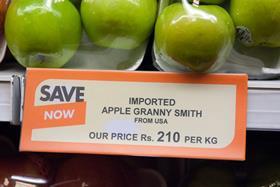
Apple suppliers are mounting their defences against the sudden changes to India’s quarantine requirements announced two weeks ago, which if implemented will practically halt all apple imports to the country.
The draft quarantine amendments submitted by the Indian Department of Agriculture and Cooperation at the end of January require all imported apples to be fumigated with high levels of methyl bromide at 21°C for two hours, and to undergo cold treatment prior to shipment.
The consensus among suppliers is that such treatment will damage the shelf life and quality of the fruit to such an extent access to the Indian market will effectively be cut off.
The US, a major and growing supplier of apples to India during the Northern Hemisphere season, has this week asked Indian officials to delay the introduction of the new requirements for a year to allow proper comments to be submitted.
New Zealand, a key supplier in the opposite season, is also “firing everything we have at it”, according to industry sources.
“We’ve developed plans here about how we’re going to respond to it,” Peter Beaven of peak body Pipfruit New Zealand told Asiafruit. “We’re going to do a technical submission as quickly as possible.”
Asiafruit understands that as of today some overtones have been made by Indian officials suggesting they are willing to discuss a delay.
At the heart of the new requirements is an Indian concern about Mediterranean fruit fly (Medfly). Both New Zealand and the US are free of the pest, and their technical submissions are expected to centre on that fact.
Exporters are seriously concerned about the timeframes, however. The new regulations are due to be put in place on 31 March, while the US is still shipping fruit to India and New Zealand is just beginning.
“The last ship to reach India before 31 March goes on 2 March,” said Sam Newbigin of exporter Fern Ridge. “But with the late season, if the bulk of apples only start harvesting at the end of February, it’s a tiny window.”
India has become a significant market for both New Zealand and the US over the last few years – the US shipped around 70,000 tonnes of fresh apples to the market from January to November last year, while New Zealand sent 650,000 cartons (around 11,700 tonnes) in 2011.
The potential sudden loss of that market will cause some significant problems for exporters.
“The big impact is on Red Delicious,” explained Fern Ridge’s Hamish Davies. “We export quite a large volume of it to India. We don’t start shipping until the beginning of April.
Really the only market for Red Delicious is India. Where will those Reds go? That’s a good question. The only thing we can do is try to delay the packing and hope something changes.”






No comments yet